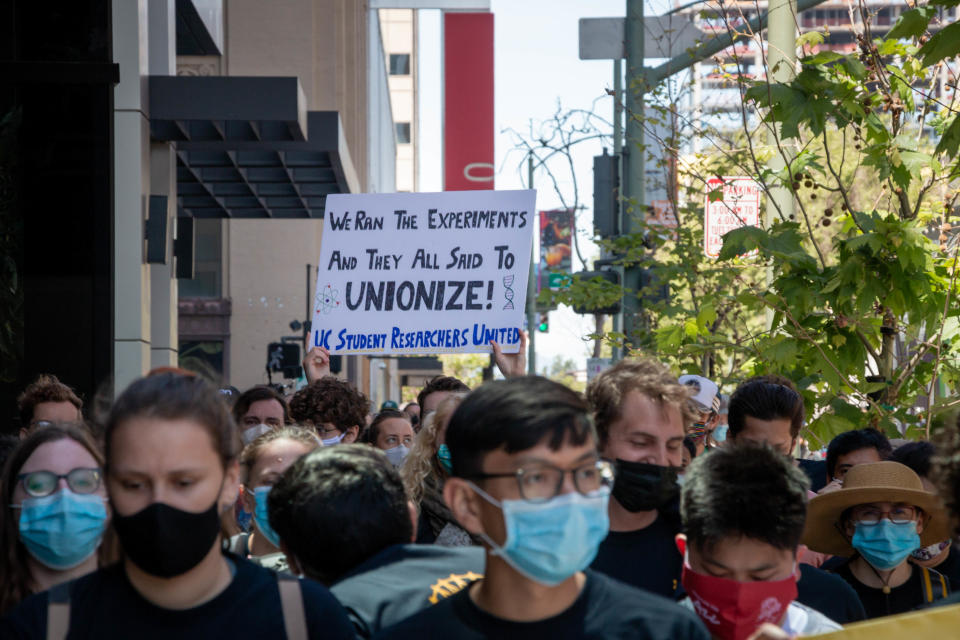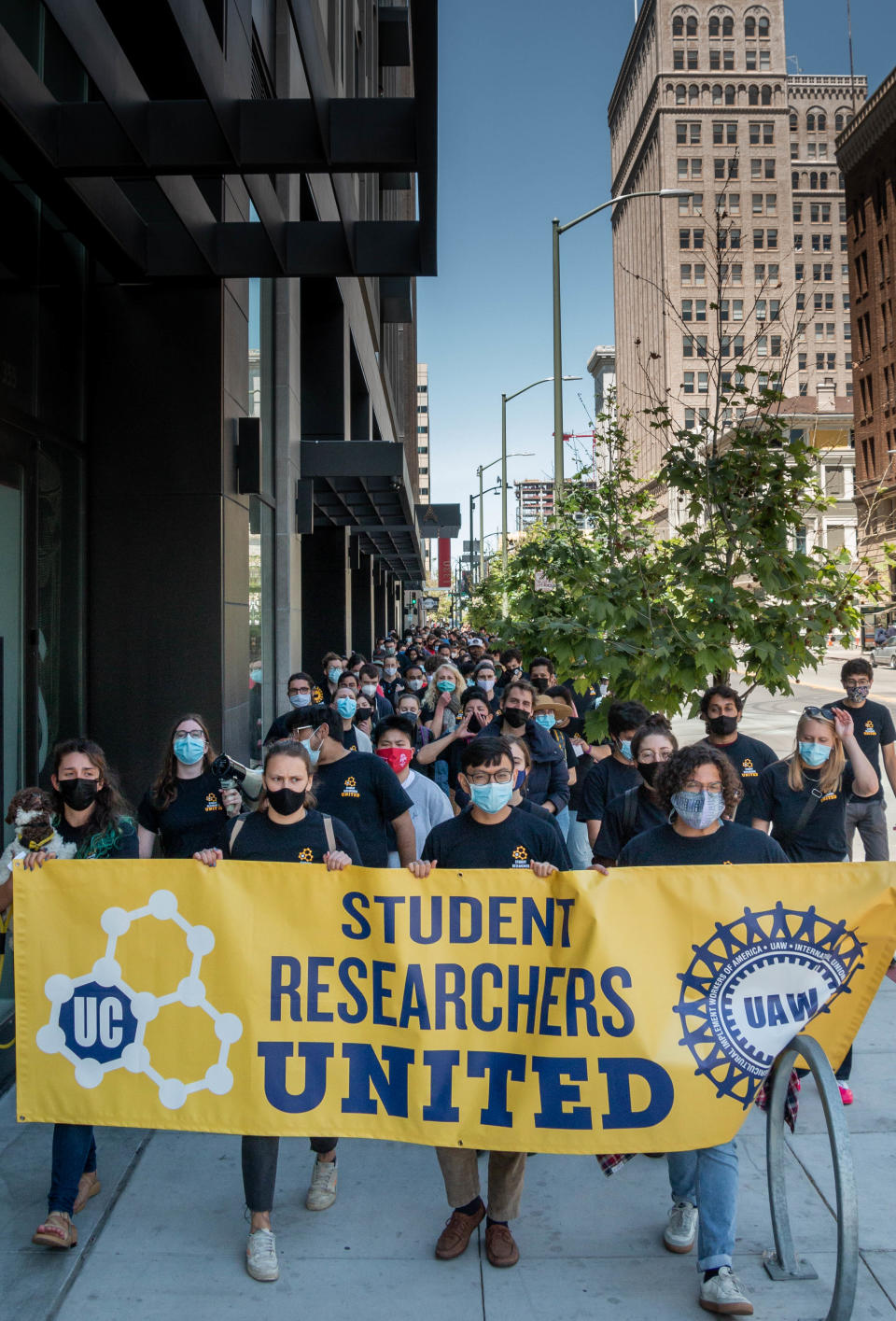University of California Student Researchers Are Forming a Union of More Than 17,000
Forming a union doesn’t happen overnight. It requires hours of conversation, explanation, persuasion, follow-ups. For student researchers at the University of California, the process has been underway for months, and on Monday, May 24, their efforts resulted in a remarkable success: They submitted more than 10,000 signed union cards to California’s Public Employee Relations Board, announcing their intent to join the United Auto Workers (UAW). The proposed union, Student Researchers United-UAW, would represent over 17,000 higher education workers across all 10 University of California campuses and Lawrence Berkeley National Laboratory. The organizers claim it would be the biggest new union formed in 2021, so far.
“We’ve been having conversations with everyone in our departments about what it means to form a union, asking people to sign authorization cards, and starting conversations about how a union can improve our working conditions,” Hayley Bounds, a graduate student and researcher in the neuroscience and molecular and cellular biology department at UC Berkeley, tells Teen Vogue. “The COVID-19 pandemic brought into focus just how little say we have in our jobs, even as we’re expected to work 60-hour weeks for wages that barely cover the cost of living in expensive cities like Berkeley. We’re expected to be passionate and put everything into our lab work, but when everything was turned upside down by the pandemic, we were expected to sit tight and just wait to hear what would happen next while administration decided what was best for us.” Teen Vogue has reached out to UC Berkeley for comment.
Bounds is one of many graduate students at schools nationwide who felt unsupported by their institution during the pandemic. In May 2020, graduate students at more than 75 public and private universities across the United States and Canada, including Yale University, the University of Chicago, and schools within the University of California system, mobilized under the name X-Campus. At issue: combating what students said were inadequate COVID-19 protections for service staff and other student workers and arguing for fair pay and to receive health care. At Columbia University, 1,700 medical researchers also organized with the UAW last year, arguing for protections against sexual harassment and a more stable work environment.

According to Katie Augspurger, a student researcher at UC San Francisco, UC students have not started bargaining because the university system has not officially recognized their union. In the meantime, members of Student Researchers United-UAW have put together a few basic demands: “We’re asking for higher pay, protections against harassment and discrimination, and protections for international students, among other things,” says Augspurger. Teen Vogue has reached out to UC San Fransisco for comment.
In an email to Teen Vogue, a spokesperson for the University of California system states, “UC values its graduate student researchers and their many contributions to the University. UC neither discourages nor encourages unionization. UC supports employees’ right to choose for themselves and to make an informed decision.”
Student researchers at UC schools tell Teen Vogue that although they are completing a master's or Ph.D. program, they are rarely in class; instead, they work on research anywhere from 40 to 60 hours a week, sometimes more. Many researchers feel they lack adequate worker protections, and a number of the researchers tell Teen Vogue that their stipend is not enough to cover cost-of-living expenses.

“There is a pervasive attitude that student labor is not as valuable since we are ‘inexperienced’ and therefore do not need to be paid as much,” Ahn Diep, a student researcher at UC Merced, tells Teen Vogue via email. “However, our labor is undeniably valuable, and the UC runs because we work.” UC Merced has directed a request for comment to the central UC office since the organizing effort is systemwide.
Kiku Koyano, a student researcher at UCLA in the bioinformatics department, tells Teen Vogue that they joined the union in an attempt to address what they say are low wages that do not fully cover their cost of living. According to Koyano, rent for a single room in a two-bedroom, two-bathroom apartment in Weyburn, the graduate student housing, is $1,430, while student researchers, whose academic year hours are generally restricted, typically earn between $1,780.38 and $3488.63 per month. “The Ph.D. program can be five or six-plus years, and that’s a long time to be under financial strain,” she says. “With our current stipend and rent prices in L.A., many of us are living paycheck to paycheck. In addition, late-payment issues from administrative and funding errors are not uncommon.”
Last year, some students at UCLA were compensated with Amazon gift cards instead of small sums owed to them by the university. At the time, a representative from UCLA told Vice: “The University of California's central payroll office recently discovered an error in tax withholding for some student workers during a portion of 2019. For those cases where the error was greater than $10, the university issued a check for the correct amount. For those cases where the error was $10 or less, the average amount over-withheld [was] $4.36." Teen Vogue has reached out to UCLA for comment.
Student researchers across the UC system are currently waiting to hear back from the Public Employers Relations Board about the official status of their union. Afterwards, they hope to enter into official negotiations with university officials.
“A lot of us really love our research and we don’t want to quit,” says Augspurger. “We want to improve our working conditions. We are hoping this union will make graduate school a better, more enjoyable, and more equitable place to work.”
Want more from Teen Vogue? Check this out: What a Labor Union Is and How It Works
Stay up-to-date with the politics team. Sign up for the Teen Vogue Take!
Originally Appeared on Teen Vogue

